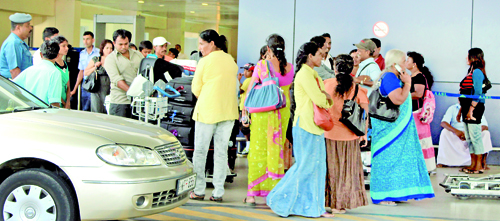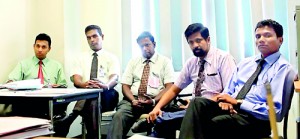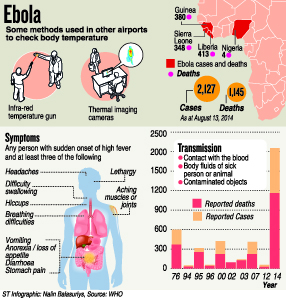News
Killer disease Ebola: Porous defence at BIA raises combat questions
As the World Health Organisation sends out an SOS saying that “extraordinary measures” are needed to contain the killer disease Ebola, in Sri Lanka the steps the authorities have taken so far appear neither effective nor adequate. A Sunday Times investigation has found only passport holders from the affected countries – mainly Liberia, Guinea, Nigeria and Sierra Leone – are required to go through the mandatory screening process. They will not get Immigration clearance to enter the country unless they are cleared by the airport health centre.

BIA: No proper mechanism to screen passengers who may have visited the affected countries in the recent past. Pix by Anuradha Bandara
However, the authorities have no proper mechanism to screen passengers who may have visited the affected countries in the recent past. The health authorities at the Bandaranaike International Airport are largely dependent on voluntary declarations by passengers to prevent anyone suffering from the disease from entering the country.
“We direct passengers from the affected countries to the health centre for a mandatory health check. We have also put up posters asking passengers to report to the health centre if they have been to any of the affected countries during the past 21 days,” senior Immigration official G. L. Dias told the Sunday Times. But he admitted that such measures were not effective as not many people volunteered to declare that they had visited the affected countries in the recent past.
Dismissing such claims, Dr. Iresha Dasanayake, the Public Health Consultant at the Health Ministry-run medical centre at the airport, said immigration officials were in a position to detect passengers who had been to the affected countries. However, he did not elaborate on how this was done, although it would be possible by perusing the passports of passengers.

The medical team at the BIA health centre
Dr. Dasanayake claimed that the current system in place was sufficient to combat the threat.
A specially trained team is on stand-by round the clock to respond to any emergency, he said.
The consultant said the frontline staff of the airport had also been appraised of the virus and precautionary measures to be taken. He said it was mandatory for passengers arriving at the BIA from Ebola-affected countries to fill a form and declare if they had symptoms such as fever, headache, vomiting and bleeding, among others, and whether they had come in contact with an infected person.
The health centre would assess the declaration and take a decision whether the passenger in question should be allowed to proceed, he said.
Also defending the measures taken to keep Sri Lanka Ebola-free was Dr. Paba Palihawadana, the Health Ministry’s Epidemiology Unit chief. According to her, the system in place builds a data base of all passengers arriving in Sri Lanka from the affected countries and to monitor them for 21 days through Medical Officers of Health in the area they would be residing in.
However, critics said that such a system was not fool-proof or effective. Besides, the lack of proper protective gear and equipment such as that used in airports in other countries raised questions regarding the effectiveness of the system in place.
The Sunday Times also spoke to the public medical officer at the Mahinda Rajapaksa International Airport at Mattala to find out measures, if any, that were in place to detect possible carriers of the disease, which, according to the international volunteer group Medicine Sans Frontier, is moving faster than the authorities can handle and could take six months to bring under control.
The officer said the threat level at the Mattala was minimal as no aircraft from the affected countries used the airport.
Meanwhile, Foreign Employment Bureau General Manager H. Batagoda said there were no immediate plans to evacuate any Sri Lankans from any of the affected countries. His remarks came conflict with claims by Foreign Employment Minister Dilan Perera and officials that plans were underway to evacuate Sri Lankan workers in West African countries.
“There are no registered workers in Liberia or any other country affected by the epidemic. There are only 200 Sri Lankans working in West African countries registered with us. We don’t see an immediate threat; so we will not be planning any immediate evacuations,” he said.
However, he admitted the figure could be higher as there could be Sri Lankans who had been living, visiting or working there without registering with the bureau.
“The bureau cannot do anything about those workers unless their family members here request our assistance. Then we will be able to provide assistance,” he said.

